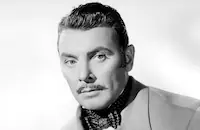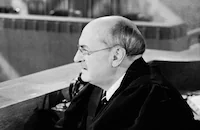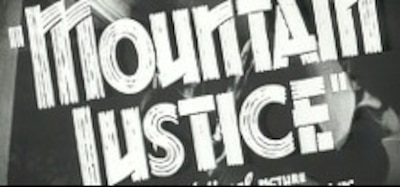Mountain Justice

Brief Synopsis
Cast & Crew
Michael Curtiz
Josephine Hutchinson
George Brent
Guy Kibbee
Mona Barrie
Robert Barratt
Film Details
Technical Specs

Synopsis
Ruth Harkins wants to start a clinic, which would be headed by Dr. John Barnard, to benefit the mountain community where she grew up. She meets only ignorance and prejudice from the community and from her father, Jeff Harkins, who forbids her to assist Barnard. At a traveling carnival, Ruth meets Paul Cameron, a lawyer from New York, who is in the mountains to try Ruth's father for killing an outsider. At Jeff's trial, Ruth is one of the witnesses and her limited and reluctant testimony helps convict him. Although he is given a very light sentence, Ruth is accused of disloyalty and of choosing a lover over her father. Months later, Jeff is released from prison a day early, and arrives home to find that Ruth has sold an acre of land that she owned and has used the money to dress up the Harkins' home. He destroys all her efforts, demanding the rest of the money be given to him. Paul returns to the mountains to tell Ruth of his love for her and to beg her to come with him to New York. She refuses, still determined to build the clinic before she allows herself any personal pleasure. Learning of Paul's visit, Jeff insists that Ruth marry a man of his choice and whips her when she resists. That night, her mother takes her to Barnard's house. He and his long-time fiancée Phoebe Lamb give Ruth the money to complete her nursing studies in New York. Although she does not tell Paul of her presence in the city, he discovers her and convinces her to go out to dinner with him. Ruth again refuses to marry him until she has started her clinic. Evelyn Wayne, one of Ruth's fellow students, agrees to join her in the effort, and even puts up the money. The clinics spread, and are supported by the women of the community, who are determined to get good care for their children even if they have to go behind their husbands' backs. Ruth's father will not forgive her for her defiance and forbids her to see her mother and sister Bethie. Facing a forced marriage, fourteen-year-old Bethie runs away to Ruth's, but is followed by her father. Jeff again tries to whip Ruth, and while defending herself, she kills him. Paul rushes to her defense, presenting evidence that Jeff actually died of heart failure, not from the blows that Ruth inflicted on his head. Nonetheless, she is found guilty and sentenced to life in prison. The mountain crowd, outraged by what they perceive as her disrespect, pushes for lynching. Using the mob as a cover, Ruth's friends, including the people whose children she helped save, remove her from prison. She and Paul fly to another state, where the governor commutes her sentence.

Director

Michael Curtiz
Cast

Josephine Hutchinson

George Brent

Guy Kibbee

Mona Barrie

Robert Barratt

Margaret Hamilton

Robert Mcwade

Fuzzy Knight
Edward Pawley

Elizabeth Risdon

Granville Bates
Russell Simpson
Sybil Harris
Guy Wilkerson
Marcia Mae Jones
Crew
George Amy
Milo Anderson
Henry Blanke
Lou Edelman
Leo F. Forbstein
Mrs. Elizabeth Hearst
Max Parker
Norman Reilly Raine
Irving Rapper
Sherry Shourds
Luci Ward
Jack L. Warner

Film Details
Technical Specs

Articles
Mountain Justice
By Richard Harland Smith

Mountain Justice
Quotes
Trivia
Contemporary sources suggest the film was based on a real murder case where a woman killed her own father.
Notes
Elizabeth Hearst, who is credited as technical advisor, was a Kentucky schoolteacher. Contemporary sources suggest that the film was drawn from the real-life murder case in which a woman named Edith Maxwell killed her own father. According to Film Daily, Bette Davis was assigned to the film.















